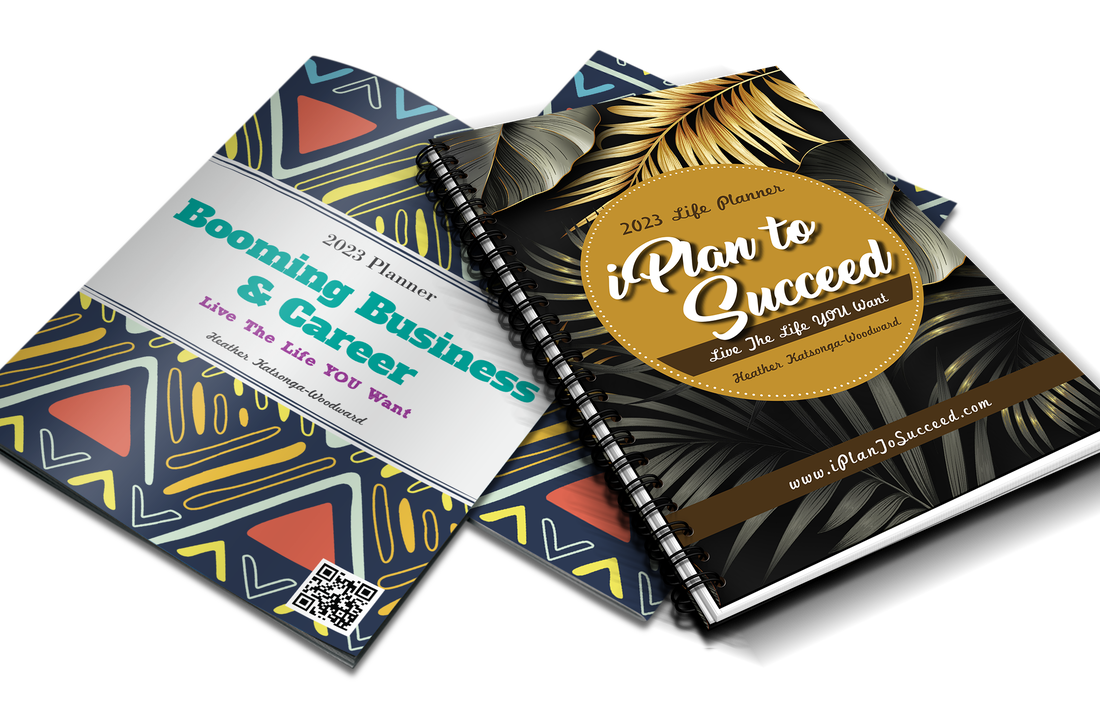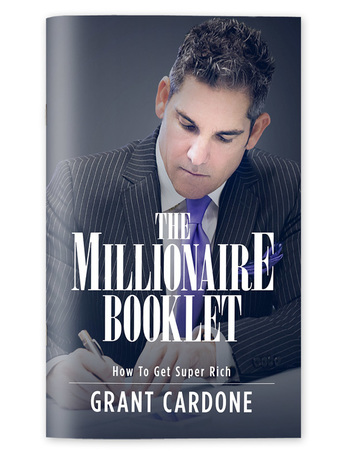 Rating: 5/5 I find it hard to argue with anything Grant Cardone ever says – sometimes he even writes things almost exactly as I have written them in some of my wealth writings. As you might know from previous book reviews I am a massive fan. He is an awesome sales person and I love his go-getting attitude. Frequently authors can’t narrate their own books better than a professional narrator would but Grant Cardone is one amazing narrator. Just to give you an idea of how much I love the guy, I wanted to call my son Grant Cardone Woodward but the good husband forbade it. Given I’ve read better books by Grant this isn’t life changing and its advice may perhaps seem basic but in the 2 hour audiobook he reminds us what success takes. The Millionaire Booklet is spirit renewing. One of my favourite lines in the book comes when he decides to become a real grafter and essentially stops going out. Grant's friends were like "we never see you in the club, Grant, what's going on?" and he was like, "You never see me in the club just like I never see you at the bank"! Boom, in your face. It's this forthrightness that makes me like the guy so much. As with all his books, the book made me feel ready to conquer the world and made me want to get out there and find who’s got MY money. The Millionaire Booklet is available on amazon.com and amazon.co.uk. My other book reviews: By the way, did you know that Grant Cardone built his $400 million fortune through property? Yes, he did - if you want to do the same thing, check out my property course.
0 Comments
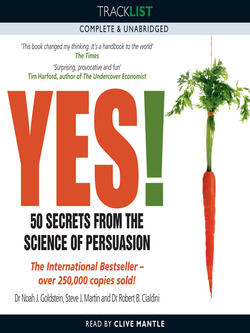 Rating: 4 / 5 Who doesn’t want to be more persuasive? Whether you own a business or not you’re constantly in the business of trying to sell something – your great traits as an employee or wife(!), a project or even an idea. Heck, if I got a penny for every time one of my mummy friends said, “I want to do x but I just need to convince my husband”, I’d be richer than Donald Trump! I’ve had the paperback version of Yes! For ages but it’s only when I got the audio version that I got to the end. The book is based on the subtle changes we can make to influence a decision. All 50 examples in the book are based on empirical studies so they are scientifically proven to work. There are 50 ideas in this book so there is no way I can summarize them all but a few examples include the following:
There were tonnes of good tips here and I, in fact, feel I should re-read this book because I was very distracted over the period I read the book. I’m preparing for a property renovation so I was driving along half listening to the book and half thinking about the different tiles I’ll put in each one of my bathrooms. Everyone has to sell something, even if it’s just yourself or your views so give this book a read to become more of a gentle persuasion artist. It’s available on amazon.com and amazon.co.uk. 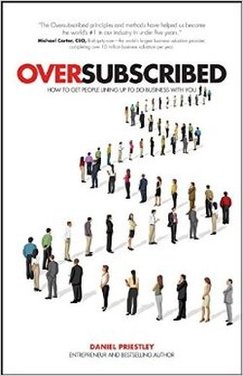 Rating: 5 / 5 Business and enterprise is a journey. It doesn’t matter which books you read, you will inevitably make mistakes; that’s part of the process. If someone presents you with a full roadmap to achieving your dreams you can’t skip fundamental steps and still expect to get where you’re going. Yes, you can take shortcuts by implementing some ideas and concepts in an innovative way so that you drive straight through some stumbling blocks but there are certain fundamental roads you cannot skip. I feel all of Daniel’s concepts are actually easy to implement and don’t leave you asking a million more questions that you can’t answer yourself. Some of the successful people I follow seem to have gotten there by simply being in the right place at the right time without a system they can teach others to follow. Daniel Priestley isn’t one of those. This is why he’s used the same system to grow a few businesses. He’s a very impressive thinker. Having a core team is one of his key suggestions. I’ve been running my own business for over 3 years now and I’ve avoided employing people full-time because I thought it was a major hassle. I saw it as an inconvenience because I couldn’t be bothered to deal with employment legislation. I’ve done a lot by leveraging third-party services such as contract manufacturers, fulfilment houses and freelancers and it’s paid off as the $202,000 made on Amazon USA proves, however, it’s becoming clear that further growth will require a team. I finished listening to Oversubscribed and two weeks after taking stock of where my business has gone I’ve realised that I now own my job! My inbox fills up at an atrociously rapid rate which is great because it means something is working but it also means I have to take my laptop on every holiday.
I can work from anywhere in the world, I only work a few hours a day and indeed I hold inventory in the US and in the UK now so I am essentially a one-woman multinational with no full time employees – even I don’t work full-time hours **gasp**. But, what’s the point of carrying your job wherever you go? A business should reach a point where you can go away for two weeks without checking your inbox at all with an expectation that things will still run smoothly in your absence. These are some of my reflections since reading Oversubscribed and I’ll definitely have more on the second listen of the audiobook but I’ve also taken fundamental action. This week I viewed offices for the first time and I am about to start advertising for two roles. One of the roles has been filled before I’ve even committed to the office facilities. A fellow Cambridge grad and friend believes in the work I’m doing so much he’s coming on-board. He’s an engineer with a completely different skill set to mine so it’s a perfect complement. Ultimately, when you read Oversubscribed you will more than likely be inspired by different elements of the book to the ones that inspired me. It all depends on where you are in your business. Employing people is a huge step but when you hire people each person is not just a cost centre but also a revenue centre. A small business with a limited budget has to spend money in the right way so hiring the right people upfront is key. After that you need to track your progress weekly if not daily to ensure you’re on the right path. Having completed Daniel Priestley’s Key Person of Influence program I continue to learn so much from him and the community he’s built. For that, I am grateful. 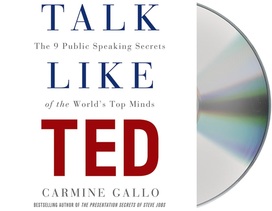 Rating: 5 / 5 In many way this book is similar to Yes!byCialdini and Goldstein in that it’s based on empirical analysis but in my opinion it’s better written or told, given I listened to the audiobook. Ted Talks have been loved by billions the world over so the secrets behind the success of the best presentations is inherently interesting. Nine secrets were revealed:
Another book that is so worth a read;get it on amazon.com or amazon.co.uk. 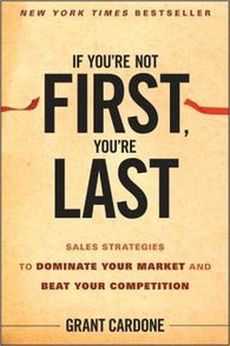 Rating 4.5 / 5 My love affair with Grant Cardone continues. This is the second of his books that I have read and whilst it deserves a good rating, there needs to be at least a point differential between this book and Sell of Be Sold. But because he’s Grant, I gave him an extra 0.5 – just for being awesome! The book was structured like a learning program with questions at the end to ensure you understood what had just been said and would implement the suggestions. I didn’t do the exercises as I was listening on the go but I took a few notes, as always: Many people don’t finish things they start because:
A sure-fire way to ensure you never get to first place is to compare yourself to losers! That is, people that are less capable than you. You have to take massive action to succeed. We’re socialized to be average, conformist and not to take grand actions. However, if you want above average success you need to:
More notes:
Finally, the placebo effect pretty much proves that what goes on in your mind can have REAL effects and consequences. Thoughts and beliefs massively impact outcomes. So the stories you tell yourself CAN and in fact, DO, become self-fulfilling. The book concluded by stating that your financial situation is the sum total of the action you took yesterday. Indeed, I have been a firm believer in this kind of thinking for decades: I honestly believe my results at A-level and indeed in university were the sum total of dedication and hard work that I had put in since I was 11. After a certain point, when we compare ourselves to someone and want to replicate their success don’t look at what they are doing now, look at what they were doing 10 years ago (or even further back) and start doing all that stuff too. Current actions simply reflect the cumulative effect of previous actions: big and small. 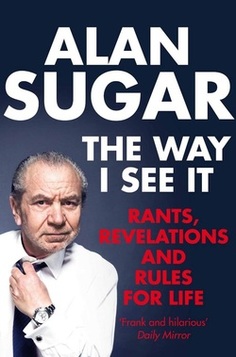 Rating: 5/5 I actually started reading this book in Feb-2014 as Harry and I flew into India. I was due to be interviewed for The Apprentice and thought I needed to do a little research. Whilst I don’t agree with all of Lord Sugar’s opinions I enjoyed his book. He is definitely very switched on and the book was 100% authentic. It stays true to the persona that he portrays. I personally don’t find him to be “mean” on The Apprentice, he is realistic. He doesn’t pussyfoot around and he doesn’t like nonsense. I am very much like that too. Lord Sugar isn’t afraid to offend people. If he doesn’t like you, you will know about it. There’s no pretense with him; very few would dare to describe someone as “That nasally congested hag Janet Street-Porter”. Some Amazon reviews I read prior to this purchase thought he sounded misogynistic, I beg to differ. If you’re a small business the points he raised about maternity leave etc. were very valid. Employees just don’t see things the same way because they have a limited idea of how money is earned. Their concept of credit risk, exposure and the costs of hiring and training is very limited; importantly, even if you understand that stuff in principle you can never fully understand the pain until you are actually running a business. In the book, Lord Sugar goes through many of his thoughts including:
Some of his pearls of wisdom include:
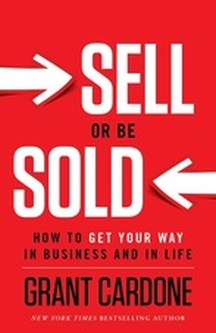 Rating: 5/5 This is possibly the book I enjoyed reading the most in 2014. It made me feel pumped and introduced me to pig latin. Grant Cardone has a strong personality and strong opinions and they definitely come through in the book. My notes:
I loved the bit where he’s analyzing how much time there is in a day to spend working (I paraphrase): if I spend 2 hours with my kids, 1 hour with my wife, that’s 3 hours with my family; plus 7 hours in bed – what does that leave me? 14 hours. Wait am I doing this right, yep, that’s right that leaves me exactly 14 hours to do what? Grow my bidness! Grant Cardone just made the word bidness cool for me because he’s cool and he uses it. I was a little lost when he used the words itchbay, ickday, itshay but it later transpired they were b*tch, d*ck and sh*t in pig latin. It sounds a lot more acceptable in in pig latin. In summary, I love Grant Cardone and I would definitely do one of his sales programs. 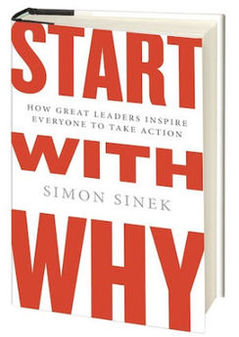 Rating: 3.9 / 5 A good listen. Achievement vs. Success Apparently every year, 40 to 50 business owners sit and talk about “stuff” at a Gathering of Titans on MIT’s campus. They don’t necessarily talk shop but about things pertaining to the bigger picture of life and business. Simon Sinek attended one of these talks. When asked, “How many of you have achieved your financial goals?” 80% of hands went up. However, when asked , “How many of you feelsuccessful?” Far fewer hands went up. Many of these great leaders knew what they did and how they did it but they no longer knewwhy they were doing it. Simon Sinek defines:
Achievement occurs when you pursue and reach something and a feeling of success comes when you are clear about why you wanted to attain that thing in the first place. I like this story because I could relate to it. I learnt very early in my career as an investment banker that financial achievements frequently didn’t lead to a feel of overall success in life. On Corporate Ethos In stating the general values of a good Southwest Airlines CEO, I loved the quote from Howard Putnam who said, “I’m not paying 5 bucks for a coffee; and what the heck is a Frappuccino anyway?” when Sinek suggested they take a break for a Starbucks. It isn’t that he was cheap but he simply didn’t attach much value to a hot a drink and no matter how wealthy he was he wasn’t going to pay for one, he was “an every man”. I respect that. On Money Money is never a cause, it’s always a result. I loved that quote too because I elaborate on a similar principle in the “Success” section of The Money Spot™ program. 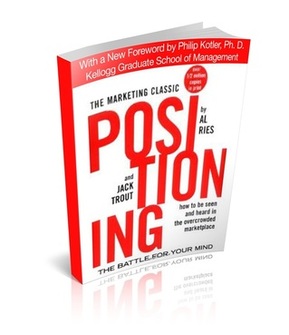 Rating: 3.75/5 This was an interesting read but not very memorable without notes. The only note I made was: Out of mind, out of business. I guess this is enough because all I have to ask myself every day is, what has my business done today to stay at the top of customers’ and fans’ minds. Overall, the idea and concept of “positioning” suggested that a product has to be positioned in the market so that, to a customer’s mind, you are somewhere along a hierarchy: e.g. the budgetbrand, the premium brand, the cool brand that you want people to see you ‘supporting’, the sexybrand, the glamorous brand etc. Position yourself as being the FIRST & BEST at something. No one remembers the 2nd place product. There is a great slideshow on SlideShare.net by Sameer Mathur elaborating the concept of positioning. What I love about the positioning concept is that it too emphasizes that we have moved beyond buying products especially in the developed world. It describes the 1950s as the “product era” – an era when you focused entirely on product features and benefits and the current time as the era for strategizing and focusing on “position”. The book had a range of interesting case studies too that I enjoyed listening to. 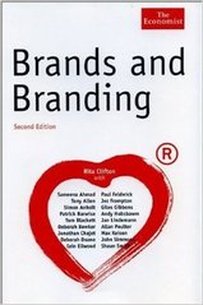 Rating: 3.5 / 5 For the most part I found this book a little disappointing because it was overly focused on big businesses (fortune 500) as well as what I would call traditional models of creating a brand. The book was a compilation of thoughts from a range of authors. My notes included: Reasons People Buy Products:
If you don’t have a brand you have no way to create mass consumer loyalty. There are low levels of trust in large companies but high levels of trust in specific brands. Customer spend, customer retention and customer willingness to recommend a product are correlated with the strength of the relationship between the customer and the brand. Relationship Strength with a customer grows if you:
Ultimately, consistency leads to trust. I did finish the book so it was worth finishing but to be honest I didn’t learn as much from it as I had hoped. |
Heather Katsonga-WoodwardTime allowing, I love to read. If I read anything interesting, I will blog about it here. 2019 Life and Career PlannerCategories
All
Archives
January 2019
|
Heather Katsonga-Woodward, a massive personal finance fanatic.
** All views expressed are my own and not those of any employer, past or present. ** Please get professional advice before re-arranging your personal finances.


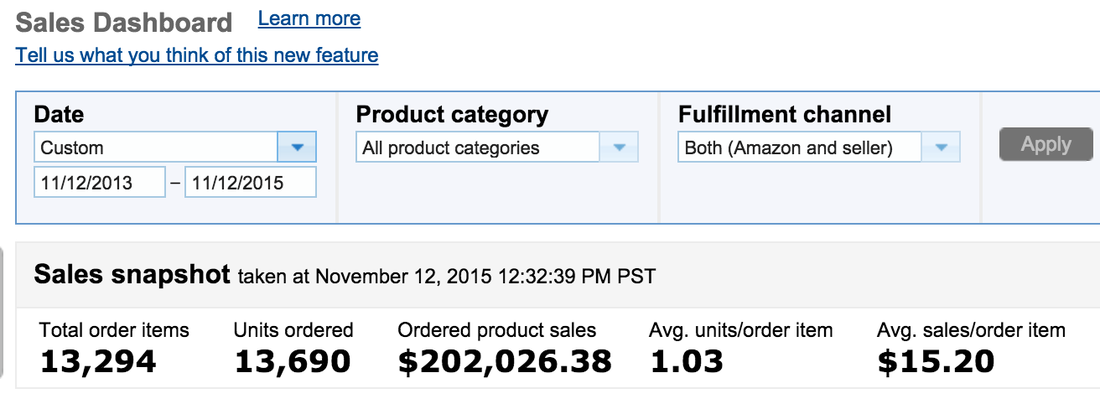








 RSS Feed
RSS Feed
